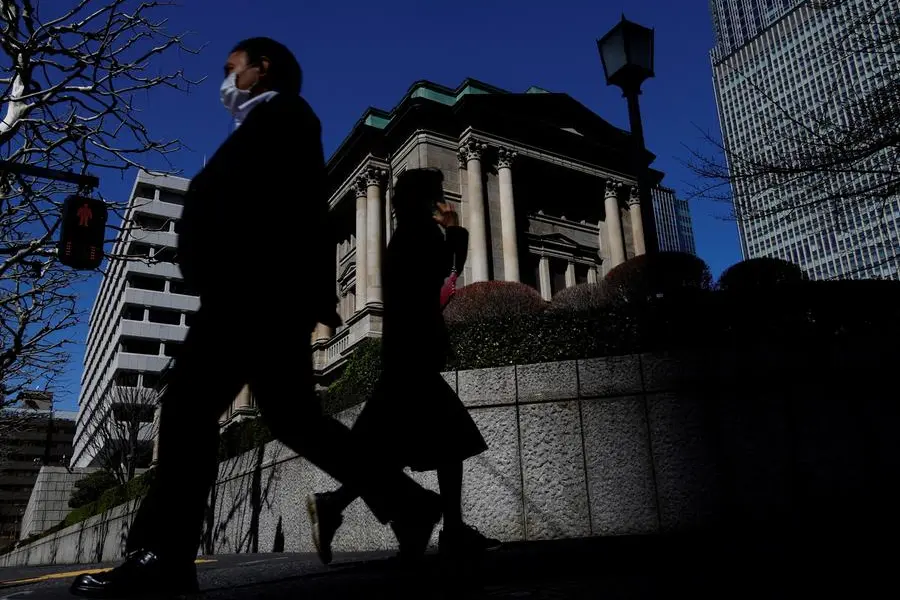PHOTO
SINGAPORE: Asian shares rose cautiously on Friday as markets sobered up to the idea that U.S. rate cuts were most likely some time away, while the yen and Japanese government bonds struggled ahead of a closely watched policy decision by the Bank of Japan.
U.S. stock futures jumped after tech giants Alphabet and Microsoft reported quarterly results that beat Wall Street estimates. Nasdaq futures advanced more than 1%, while S&P 500 futures rose 0.7%.
The highlight of the Asia day was on the BOJ's rate decision at the conclusion of its two-day monetary policy meeting, as well as Governor Kazuo Ueda's news conference thereafter.
Ahead of the outcome, the yen languished near a 34-year low and was little changed at 155.62 per dollar, while the 10-year JGB yield rose to a five-month high of 0.93%.
Other yields across the curve also notched fresh milestones, with some hitting multi-year peaks. Bond yields move inversely to prices.
Although expectations are for the BOJ to maintain its accommodative monetary policy stance, focus will be on whether the central bank makes any adjustments to its bond buying amounts - seen as a way to deliver a more hawkish stance without an outright rate rise.
Jiji news agency reported on Thursday, without citing sources, that the central bank is set to consider measures to reduce its government bond purchases.
That comes as the yen has been battered by a resurgent dollar, even after the BOJ's landmark exit from negative rates last month. Aggressive jawboning from Japanese authorities has also done little to stem the yen's decline, leaving traders on alert for any signs of intervention from Tokyo.
"There is a near consensus that the BOJ will stand pat on its policy rate today, though it could signal an impending reduction in JGB purchases in the future," said Alvin Tan, head of Asia FX strategy at RBC Capital Markets. "I expect Ueda to remain noncommittal on the timing of the next rate hike, but he could repeat his previous point that the bank would consider the impact of exchange rates on inflation."
Complicating matters for the BOJ, data on Friday showed core inflation in Tokyo slowed much more than expected in April and fell below the central bank's 2% target.
In stocks, Japan's Nikkei edged a marginal 0.02% higher.
MSCI's broadest index of Asia-Pacific shares outside Japan gained 0.27%, while Australia's S&P/ASX 200 index fell more than 1%.
Shares of BHP Group fell 4% in the first day of trading of its Australian-listed stock since revealing a $38.8 billion bid for smaller rival Anglo American in a deal that would forge the world's largest copper miner.
Hong Kong's Hang Seng Index gained 0.3%.
FED OUTLOOK
Elsewhere, investors were digesting the implications of Thursday's data which showed the U.S. economy grew at its slowest pace in nearly two years in the first quarter, though inflation accelerated.
That reinforced expectations that the Federal Reserve would not cut interest rates before September.
"The U.S. Q1 GDP report delivered the worst of both worlds, softer than expected growth and higher than expected inflation," said Rodrigo Catril, senior FX strategist at National Australia Bank.
U.S. Treasury yields surged to five-month highs in the previous session and remained elevated in Asia.
The two-year yield hovered near the 5% level, while the benchmark 10-year yield steadied at 4.7019%.
The dollar, however, slipped on the back of the weaker U.S. growth, and was nursing some of those losses on Friday.
Sterling dipped 0.09% to $1.2502 after touching a two-week high on Thursday, while the euro edged 0.04% lower to $1.0726.
Focus now turns to March's core PCE price index data due later on Friday - the Fed's preferred measure of inflation - for further clues on the U.S. rate outlook.
"We don't think inflation will give the Fed reason to tighten," said James Reilly, a markets economist at Capital Economics.
"Granted, the PCE data... could present another 'bump' in the road, extending a succession of stronger-than-expected U.S. inflation and activity prints; but the Fed has already acknowledged that these would come," Reilly added. "We continue to think that the disinflationary trend will reassert itself soon and that Fed cuts have therefore been delayed, not cancelled."
In commodities, Brent rose 0.38% to $89.35 a barrel, while U.S. crude gained 0.35% to $83.86 per barrel.
Gold eased 0.08% to $2,329.50 an ounce.




















